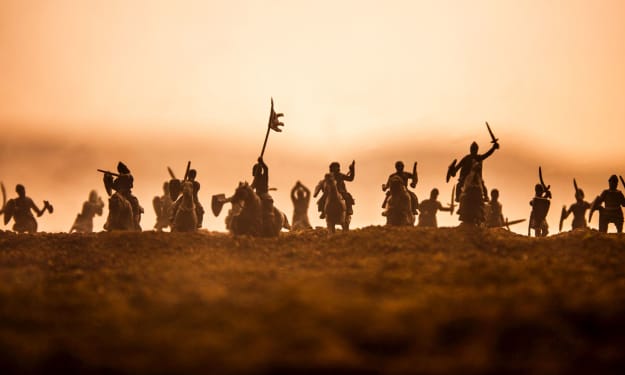Legacy of Peace
Remembrance and Reflection on the End of World War II

In a quaint village, nestled between rolling hills, an old wooden bench stands as a sentinel of memories. On the anniversary of the end of World War II, an elderly couple arrives, their fingers intertwined as they slowly make their way to the bench.
They met in the aftermath of the war, two souls seeking solace amid the wreckage. She was a nurse, tending to wounded soldiers; he, a young soldier with a bandaged heart. Their bond grew stronger with each passing day, as they found comfort in each other's company amidst the chaos.
As they sit together, his weathered hand finds hers, and their eyes meet, carrying a shared history that words could never fully express. The wind whispers through the trees, carrying echoes of distant battles and long-lost friends. They remember those who didn't return, those whose laughter still echoes in their hearts.
Tears glisten as they talk about the dreams they built upon the foundation of peace that the war's end provided. Their children and grandchildren have flourished in a world they helped shape, a world of unity and understanding. The scars of the past have become stories of resilience and hope, passed down through generations.
As the sun sets, casting a warm glow over the village, they rise from the bench. With a final glance, they silently thank the legacy of those who fought for freedom. Their love, born amidst the rubble of war, stands as a testament to the enduring power of hope, and the immeasurable value of peace.
In a world where conflicts have shaped history and left indelible scars, the need for a legacy of peace becomes not just a desire, but an imperative. The lessons learned from the tumultuous past underscore the urgency of fostering an environment that values unity, empathy, and diplomacy over hostility and aggression. Such a legacy is not a passive aspiration but an active commitment to shaping a future that embraces harmony.
The scars of wars, both past and present, serve as poignant reminders of the human cost of discord. The impact of conflict ripples through generations, leaving fractured societies, shattered families, and irreversible damage to cultural and societal structures. These wounds can persist for decades, even centuries, making the pursuit of peace not just a noble endeavor, but a necessity to ensure the well-being of current and future generations.
Creating a legacy of peace involves not only preventing armed conflicts but also addressing the root causes of tension, such as economic disparity, political instability, and lack of resources. It calls for nations and individuals to commit to dialogue, understanding, and compromise, rather than resorting to violence as a means of resolving disputes.
One of the most significant benefits of a legacy of peace is the environment it creates for growth and progress. Nations at peace have the opportunity to invest in education, infrastructure, and innovation, rather than diverting resources towards military endeavors. This, in turn, creates a cycle of prosperity that can uplift entire societies and lead to global advancements.
Moreover, a legacy of peace fosters cultural exchange and cross-border collaborations. When nations set aside their differences, they can pool their diverse talents and perspectives, leading to breakthroughs in science, arts, and technology. The exchange of ideas thrives in an atmosphere of peace, enriching humanity's collective knowledge and experience.
As we reflect on the anniversaries of historical conflicts and the subsequent paths to peace, it is essential to acknowledge the efforts of individuals, organizations, and leaders who have championed non-violence, negotiation, and reconciliation. Their stories inspire us to carry forward the torch of peace, to forge connections instead of divisions, and to be the architects of a legacy that future generations will cherish.
In a world grappling with complex challenges like climate change, pandemics, and resource scarcity, the need for collaboration and understanding is more critical than ever. A legacy of peace is not a mere idealistic notion; it is a pragmatic approach to securing a stable and prosperous future for all.
In conclusion, the world's history is marked by chapters of conflict, but it is our collective responsibility to ensure that the legacy we leave behind is one of peace. By embracing diplomacy, fostering understanding, and committing to the well-being of humanity as a whole, we can shape a world where peace is not just a fleeting moment but a perpetual state of being. The need for a legacy of peace transcends national borders and cultural differences—it is a universal call to action that resonates with the deepest aspirations of humanity.





Comments (1)
Hello, AI is permitted on Vocal. It is a Vocal policy that content created with AI is identified as such at the start of the story/article. Your article/story has many hallmarks of AI-assisted/generated content. You can find the details of the Vocal policy here: https://vocal.media/resources/an-update-from-vocal-on-ai-generated-content, Please amend your piece to be in compliance. If you are not a Vocal+ member you will need to contact Vocal here ([email protected]) and ask them to edit your story/article/poem for you. If you don’t correct this the content may be removed by Vocal and/or you may be deleted from the platform.